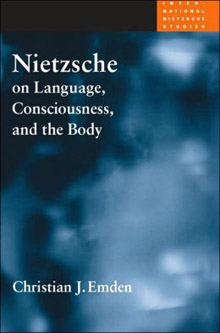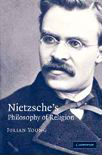- Home
- Recommended Readings
- Book Review
Book Review
-
Nietzsche on Language, Consciousness, and the Body By Christian J. Emden
Reviewed by Daniel Blue
You may download the entire book review as Adobe PDF format clicking PDF icon on the left. If you need some clarifications about copyright or usage rights, please contact us at nceditors@ietzschecircle.com.
Page 1 | Page 2
 Philologists use the phrase “Homerum ex Homero” (“Homer out of Homer”) to mean that a writer’s language should be interpreted through other writings by the same author.
Thus, one would try to understand a text in Homer by consulting parallel passages in Homer, but not by adducing works by Hesiod or later poets.(1)
Until recently, this seemed to be the reigning principle of Nietzsche studies. When attempting to understand a passage in Beyond Good and Evil one might bring to bear other passages from that book or
related sections from works published by Nietzsche, but references even to the Nachlaβ were considered suspect and books on Nietzsche and Emerson, Lange, Burckhardt and others tended to
be viewed as specialized. There are sound theoretical reasons for observing such strictures. Nonetheless, in recent years a plethora of studies have emerged, indicating how views of Nietzsche can be
supplemented and enlarged by judicious reference to the books he studied and the assumptions of his time. In Nietzsche on Language, Consciousness, and the Body, Christian J. Emden has
made an interesting, if not always convincing, contribution to this literature.
Philologists use the phrase “Homerum ex Homero” (“Homer out of Homer”) to mean that a writer’s language should be interpreted through other writings by the same author.
Thus, one would try to understand a text in Homer by consulting parallel passages in Homer, but not by adducing works by Hesiod or later poets.(1)
Until recently, this seemed to be the reigning principle of Nietzsche studies. When attempting to understand a passage in Beyond Good and Evil one might bring to bear other passages from that book or
related sections from works published by Nietzsche, but references even to the Nachlaβ were considered suspect and books on Nietzsche and Emerson, Lange, Burckhardt and others tended to
be viewed as specialized. There are sound theoretical reasons for observing such strictures. Nonetheless, in recent years a plethora of studies have emerged, indicating how views of Nietzsche can be
supplemented and enlarged by judicious reference to the books he studied and the assumptions of his time. In Nietzsche on Language, Consciousness, and the Body, Christian J. Emden has
made an interesting, if not always convincing, contribution to this literature.
His title at first seems misleading. For the first two-thirds of the book, Nietzsche’s theory of language is his paramount topic, and while he often brings in issues having to do with consciousness and the body (the secondary elements in his title), these almost always have immediate bearing on Nietzsche’s ideas on language and are rarely explored for their own sake. Only rather late—in the fourth of five chapters—does the book open into another dimension of thought. There, as will be shown, Emden proposes that Nietzsche extends certain tropes associated with language well beyond the properly linguistic sphere to encompass the neurophysiological and psychological processes of sensation and apprehension. Even in this neurophysiological treatment, however, Emden’s departure point is Nietzsche’s theory of language. As the author makes clear, the topic of language is central to Nietzsche’s vision and involves not only consciousness and the body but issues of logic (concept formation and theories of truth), hermeneutics (interpretation, perspectivism), and psychology (the ways human beings construct a self). By the time Emden has shown the implications for the will to power and Übermensch, it is clear that Nietzsche’s theory of language is intrinsic to almost all his key views, the signal exception being the eternal recurrence, a topic Emden never mentions.
It is the more regrettable, then, that Nietzsche’s single extended text on language (“Truth and Lies in a Nonmoral Sense”) leans so heavily on Gustav Gerber’s Die Sprache als Kunst. While this dependence needs to be acknowledged, Emden believes that Gerber’s influence has been exaggerated. Gerber, in his view, stressed the aesthetic dimensions of language, whereas Nietzsche’s approach emerged from his historical studies. Indeed, for Emden, interpretations of Nietzsche have in general overstressed the aesthetic aspects of his work to the detriment of its scientific and historicist underpinnings, and its study can be much enriched by consideration of the intellectual and scientific approaches of his time.
Accordingly, the author announces in his introduction that he is less interested in the validity of Nietzsche’s ideas than in how they emerged in the context of contemporary intellectual concerns. It is, indeed, Nietzsche’s “timeliness” which most engages him, for, as he observes, “ . . . philosophical ideas and arguments do not develop in a historically indeterminate space of pure thought.”(2) He also acknowledges that he hopes to use Nietzsche’s indebtedness to contemporary studies as a model through which to explore certain sociological views of Foucault, Bourdieu, and others. These men argued that the various intellectual fields at play during a given historical period intersect in ways that affect the paths of those disciplines’ research. Emden finds in Nietzsche’s work a seismograph of the shifts among the dominant intellectual approaches of his time.
Emden begins this project with an account of Nietzsche’s early views on rhetoric, a field of study out of fashion in Nietzsche’s youth and moribund for decades. In preparing his lecture courses on verbal strategies of the Greeks and Romans, Nietzsche came to believe that the development of philosophic modes of speech were intertwined with those of rhetoric and that (as Emden puts it) “reason begins with rhetoric, and rhetoric itself is largely responsible for the structure, constitution, and development of knowledge . . . .”(3) The pivotal figures here were Plato, who affected to mistrust rhetoric but who deployed it with cunning effectiveness, and Aristotle who attempted to codify its processes and thereby to establish canons of reasoning. Yet Nietzsche was particularly struck by the Sophists, who exposed the difficulty of distinguishing between philosophizing and persuasive speech. As Emden explains, “Nietzsche’s fervent philosophical interest in the problem of language . . . seems to have emerged, at least initially, in the context of an attempt to account historically for the tense relationship between rhetoric and philosophy in Greek antiquity.”(4)
Nietzsche was going against the contemporary grain by studying rhetoric at all, but Emden contends that it at least provided him with a prophylaxis against the “myth of the given,” that is, “any philosophical discourse that relies on the objectivity and universality of knowledge without realizing its own historicity and indebtedness to language.”(5) Locke’s linguistic theories provide an example of the sort of view of language that Nietzsche sought to discredit, and Emden demonstrates its deficiencies and how Nietzsche sought to remedy these.
Emden also toils mightily with Nietzsche’s characterization of language as intrinsically metaphorical, a task in which he has much valuable to say, even if he is eventually forced to concede,“ . . . attempts to limit the meaning of metaphor are always flawed and often tautological.“(6) This rather dispiriting conclusion does not stop him from continuing to use the term as though it were unproblematic. Thus, he repeatedly makes reference to “metaphor as an explanatory model,”(7) although one would think a term that is intrinsically indefinable would have no explanatory power whatever. To be fair, Emden was earlier speaking of metaphor in its linguistic usage, whereas he eventually proposes that Nietzsche extended the term to include physiological transformations as well: “ . . . what [Nietzsche] seems to mean, . . . is metaphor as an explanatory model that can comprise the complexity of nervous processes, mental representation, and language, and this model rests on the most basic understanding of metaphor as a form of transferring or transmitting some kind of information, content, or impulse from one level to another . . . ”(8)
This characterization is a bit unclear and highly questionable. Surely Nietzsche’s point in the “Truth and Lie” essay is not that metaphor functions as “a form of transferring or transmitting some kind of information, content, or impulse from one level to another,” but rather that it provides an illusory cover for the fact that no such transfer could take place. It is here, by the way, that Emden’s anti-aesthetic bias becomes rather questionable, for Nietzsche increasingly came to view concept formation as a creative and artistic act, a view that is carefully and insightfully explored by Johann Figl in his Dialektik der Gewalt.(9) If Emden’s formulation is questionable, however, he does follow it up by suggesting that discussion of Nietzsche’s positions, here and elsewhere, can benefit from consideration of the biological sciences of his time. In this instance he finds nineteenth century physiology and such topics as the transfer of electrical energy through neurons to be a propos.(10)
continues on Page 2...
-
Thus Spoke ZarathustraBy Friedrich NietzscheA new translation by Graham Parkes
Oxford University Press, 2005
Reviewed by Horst HutterThis new translation of Nietzsche’s magnum opus is by far the best available in the English language. It should find its way to the desk of all students who do not have access to the original German.
-
Nietzsche’s Philosophy of ReligionBy Julian YoungCambridge University Press, 2006
Reviewed by Horst Hutter,
Concordia UniversityEvery student of Nietzsche in the Anglophone world should read this book. It is a most able treatment of a much-ignored and much-misunderstood topic close to the very heart of the writings of this seminal thinker.
Featured in the Agonist
-
Nietzsche, Music, and Silent Suffering An Introduction
By Yunus Tuncel, The New School University, New York City
...Focus on the impact of Nietzsche's knowledge of music on his philosophy and the development of his thought.
-
Music, Posthumanism and Nietzsche
By Stefan Lorenz Sorgner, Erlangen-Nuernberg
...the first order Empfindung associated to music is the dissolution of individuality which from a posthumanist[1] perspective brings about the realisation of the embeddedness of human beings in this world. Hence, music can bring about more than pain and pleasure in the recipients.
Support Us
Please consider donating! The NC is a not-for-profit organization. As an independent organization that receives no assistance from any institution, the NC relies on your magnanimity to sustain itself. Please help support the activities of the NC with a donation Donations of any kind, whether of money, services, equipment, or in-kind gifts, are all of great necessity and deeply appreciated.
Subscribe
To receive site updates, news, and announcement from NC via email. To do so, you simply need to provide your email address below.






